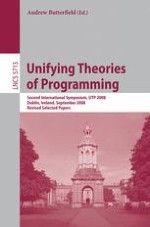2010 | Buch
Unifying Theories of Programming
Second International Symposium, UTP 2008, Dublin, Ireland, September 8-10, 2008, Revised Selected Papers
herausgegeben von: Andrew Butterfield
Verlag: Springer Berlin Heidelberg
Buchreihe : Lecture Notes in Computer Science
